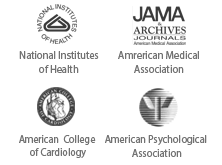Sign up for:
- Information on TM research and webinars
A Major Medical School’s Groundbreaking Curriculum Builds Resilience and Reduces Stress
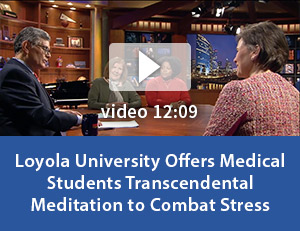
Research continues to tell us that medical school is stressful, with students reporting high levels of anxiety, depression, substance abuse, and burnout. And the stress doesn’t stop once the student graduates and becomes a doctor: according to Archives of Internal Medicine, 46 percent of physicians reported burnout in 2015.
One major medical school is trying to change all that. Three years ago, alumnus James Bray, M.D., wrote a letter to his colleague, Loyola University Chicago Stritch School of Medicine Dean Linda Brubaker, M.D., encouraging her to host a meeting with Georgetown University clinical professor of psychiatry Dr. Norman Rosenthal.
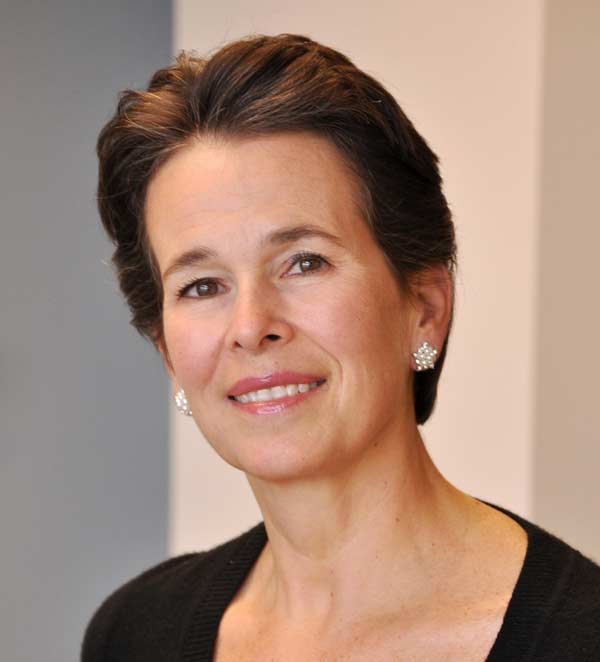
Linda Brubaker, M.D.
Dean, Loyola University Chicago Stritch School of Medicine
After hearing Dr. Rosenthal and reading his best-selling book, Transcendence, Dr. Brubaker and Vice-Dean of Education Gregory Gruener, M.D., decided to proactively address the problem of stress by introducing their students to the evidence-based Transcendental Meditation® technique as part of their curriculum.
As a result, during the past two academic years, 150 students have enrolled in an elective called “Physician Wellness through Transcendental Meditation” at Stritch School of Medicine. Forty faculty also were instructed in the TM technique, which has been shown in 380 peer-reviewed studies to significantly reduce stress, anxiety, depression, and cardiovascular disease.
The results surpassed expectations. Of the undergraduate students who took the course, more than 80 percent reported significant relief from stress. Faculty see it as a way to give their students an edge in an increasingly stressful and competitive profession.
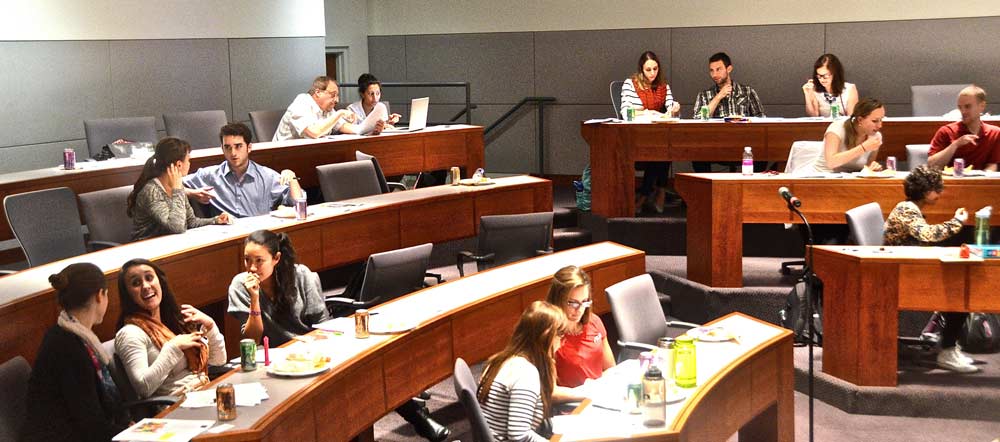
“Today medical schools and medical students are facing new challenges, such as a shortage of residency positions,” says Dean Gruener. “This means that there is no longer a guarantee that a student who completes medical school will find placement for a residency in a medical facility. It is the student who is more resilient, who can remain alert and awake and focused under pressure, who is more likely to be matched to a residency and find success in a career in medicine. With the TM instruction, we feel that our students have that advantage.”
Dean Brubaker says that this and other innovative programs offered at Stritch are attracting attention from other medical schools. “Most people are asking where can I learn, can I get on this bandwagon, because they see the benefits our students, faculty and staff are experiencing,” Dean Brubaker said in a recent WTTW Chicago Tonight interview. This is making a difference at our medical school.”
A Groundbreaking Curriculum
Carla Brown, Ed.D., Harvard-trained educator and TM instructor, and her husband, Duncan Brown, M.A., both directors of the Center for Leadership Performance for the Midwest, designed and implemented Stritch’s program. With Dean Brubaker, they point out that this elective is the first of its kind to be taught at a major US medical school. Launched in the 2014-2015 school year, the course includes instruction in the TM technique along with a roster of guest lecturers speaking from the perspectives of neurology, pathophysiology, psychiatry, and cardiology.
The curriculum was structured to allow students to start TM practice at a convenient time in their rotations, and to attend the five lectures over two semesters or via website. Dr. Carla Brown and co-author Dr. Gruener described the curriculum and outcomes of the Stritch elective in a recent article in the Chicago Medical Society’s journal, Chicago Medicine.
“As just one example, this interactive class reviewed the neurophysiology of TM, including a live demonstration of uniquely coherent brain waves (EEG) that occur during the practice. This coherence, which is associated with restful alertness, maturation, competence, and creativity is eventually maintained in daily activity,” says Dr. Brown.
For Dr. Brown and other faculty, the students’ self-reported results have been gratifying.
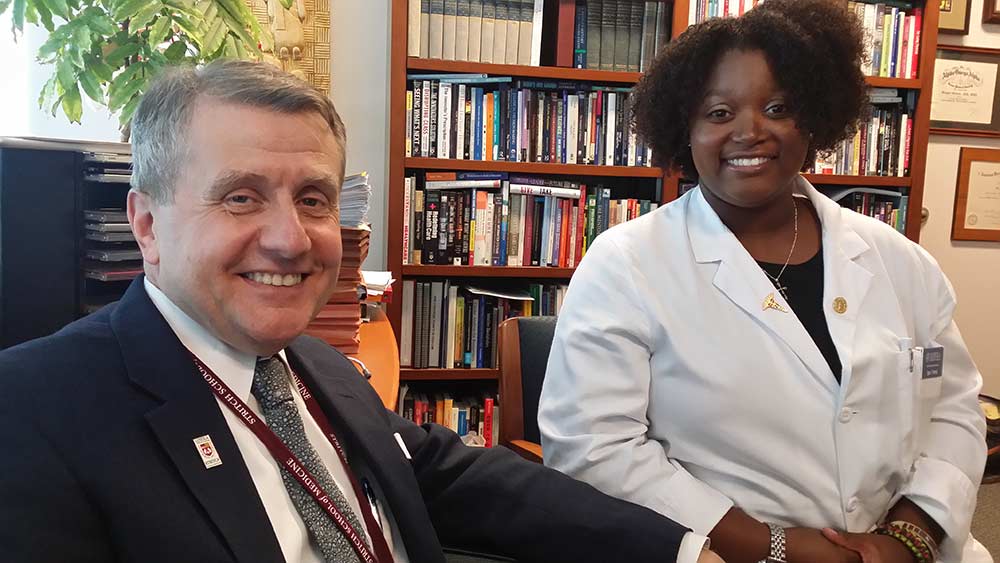
Gregory Gruener, M.D., and Danielle Terrell
“I call TM a “stress raincoat,” says second-year student Danielle (Dani) Terrell, who took the elective last year and credits TM with changing her life. “Stress rolls off me now the way rain rolls off a raincoat.”
Terrell recounts that her road rage disappeared as well as her stress-induced psoriasis. “I’m not nervous when I take exams. I can problem-solve better. All of these benefits I saw immediately, so it naturally makes you want to come back and make it a part of your life.”
Terrell estimates that she spends 60-90 hours a week in coursework, rotations, and studying. “TM makes it possible for me to do that without burning out,” she says.
Changing the Future of Medicine
While the first aim of the course is self-care, Dr. Brubaker explains that in gaining the benefit of TM practice for themselves, students also become knowledgeable about prescribing TM to their patients.
“Physicians who practice self-care, especially stress reduction, are likely to perform better as professionals and inspire their patients to adopt healthy behaviors,” says Dean Brubaker.
Course instructor Richard Carroll, M.D., points out the relevance of this curriculum to all practicing physicians.
“‘Physician, heal thyself’ requires more than an attitude, but a technique such as Transcendental Meditation to eliminate the stress and strain that is inherent in a profession like medicine,” he says. “Our goal is not only to provide students and faculty with the understanding of how the TM technique could help their patients, but how the practice will fundamentally change their experiences and serve as a foundational support for them and their careers.”
Dean Brubaker concurs. “This was really a no-brainer for us. There’s no risk to this. We really care about our medical students, and we want our students to learn self-care so they can be resilient doctors. Transcendental Meditation is one of the things that can help them get there. We want to bring them to their highest potential in spirit, mind, and body, and this hits all of them.”
She adds, “Who wouldn’t want a doctor who’s taking good care of themselves and has more to give to their patients?”

